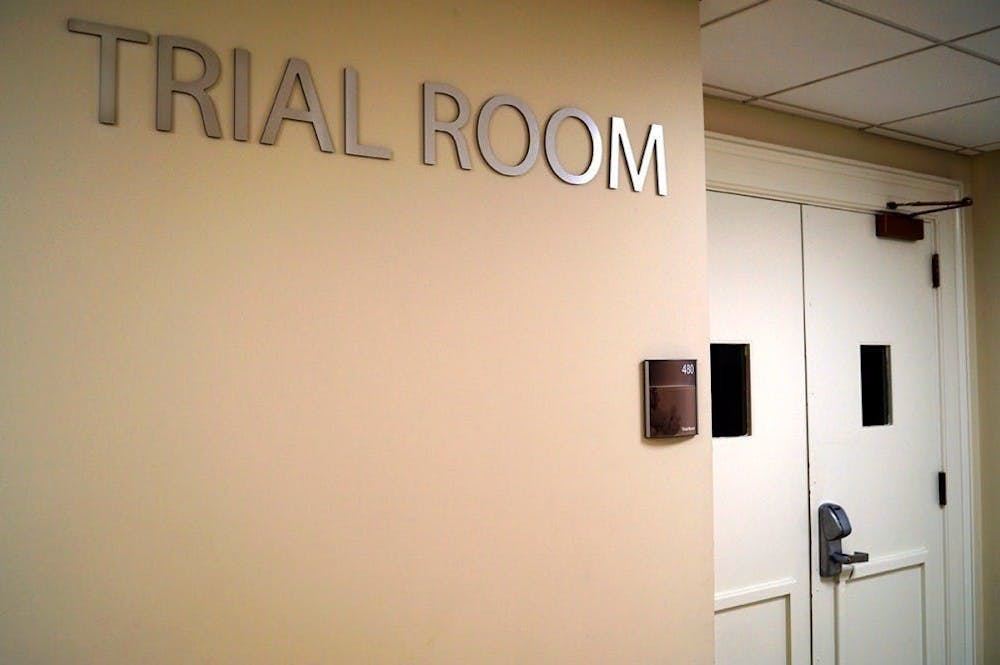The Honor Committee met Sunday evening to continue debating the details of proposed constitutional changes. This week, the committee discussed shortening the length of the Informed Retraction leave, as well as abolishing random panel juries for Honor trials.
The committee voted Sept. 19 to move forward with a constitutional proposal that would reduce the sanction of expulsion to a two-semester leave of absence if passed by the student body this spring. Last week, the committee discussed whether or not to maintain the informed retraction process — ultimately, a majority of members supported keeping the IR and requiring those who file informed retractions to take a two-semester leave of absence.
Currently, students are granted a seven-day period after being notified of an Honor accusation to file an IR, meaning they must admit guilt and take a two-semester leave of absence.
The first agenda item addressed by the full committee Sunday was the viability of the informed retraction and whether the required two-semester leave of absence should stay in place given that under the new proposal, both an informed retraction and a guilty verdict would result in the same punishment.
Some members of the committee — such as Lucian Mirra, third-year Education representative and Beau Muniz, second-year Darden representative — worried that with the same sanction for filing an informed retraction and receiving a guilty verdict, a student’s incentive to admit guilt would disappear. Muniz said that in most cases, students would prefer to go to trial knowing they have a chance to be found not guilty.
Mirra advocated for the committee to reduce the IR’s two-semester leave of absence to a one-semester leave of absence, arguing that it would offer an incentive for guilty students to own up to their actions before returning to the community of trust.
“I think we need to keep some incentives in the system to both reduce our burden of hearings, reduce that burden on faculty, incentivize reporting and incentivize students to actually admit to what they did,” Mirra said
Other representatives, such as Isabelle Kress, a third-year Education representative, pointed out that because many cohort-based programs — such as the McIntire School of Commerce or the Frank Batten School of Leadership and Public Policy — only offer courses once per academic year, students who choose to file an IR would be forced to either take two semesters off or fill their first semester back with elective courses.
“The one-semester leave of absence disproportionately affects students across the board,” Kress said.
Rep. Daniel Nakasone, third-year Batten student, said he thinks a one-semester leave of absence lacks severity and does not incentivize adherence to Honor policies adequately.
“I don't feel like a one-semester underscores how seriously we should be treating an Honor offense,” Nakasone said.
At the end of the meeting, the committee participated in a non-binding vote among members to gauge support for amending the informed retraction process. Representatives were given the option to vote for or against allowing students to admit guilt at any point up until their trial, take a two-semester leave of absence and adjust the punishment for a guilty verdict to be more severe. With the items voted on as a package, 18 out of 22 members voted in favor.
The committee then discussed a suggestion by Andy Chambers, fourth-year College student and chair of the Honor Committee, to eliminate the option for accused students to have their trial heard by a random panel of students. Currently, students on trial are permitted to choose to have a jury made up of a random panel of students, a mixed panel of Honor committee members and random students or solely Honor committee members. Regardless of the makeup, each panel must be between eight and 12 members.
Chambers said that during his term as vice-chair of hearings, 75 percent of students who went to trial opted to be heard by a random panel of students.
Meghan Wingert, third-year Law representative, expressed support for maintaining all three options for students to maintain the integrity of the University’s Honor system.
“Even if we disagree with their outcome, the philosophy of Honor is a jury of their peers,” Wingert said.
Jack Stone, fourth-year Commerce representative, was among the minority of representatives in favor of removing the option of a random panel, stating that he believes both the elimination of random panels and mandating a two-semester leave of absence will streamline the Honor process.
The committee then voted on whether or not members supported eliminating the random panel. Only three members voted in favor of elimination.
Following the committee finalizing a proposal — which they hope to do at the next meeting Oct. 17 — the student body will vote on Honor’s constitutional changes in the spring. 10 percent of students will need to vote and 60 percent of those voting will need to vote in favor of the proposal for it to pass.
CORRECTION: A previous version of this article misstated that 5 percent of students who chose to go to trial opted to be heard by a random panel. The article has been updated to reflect that during Chambers’ term as vice-chair of hearings, 75 percent of students who went to trial chose to be heard by a random panel.





